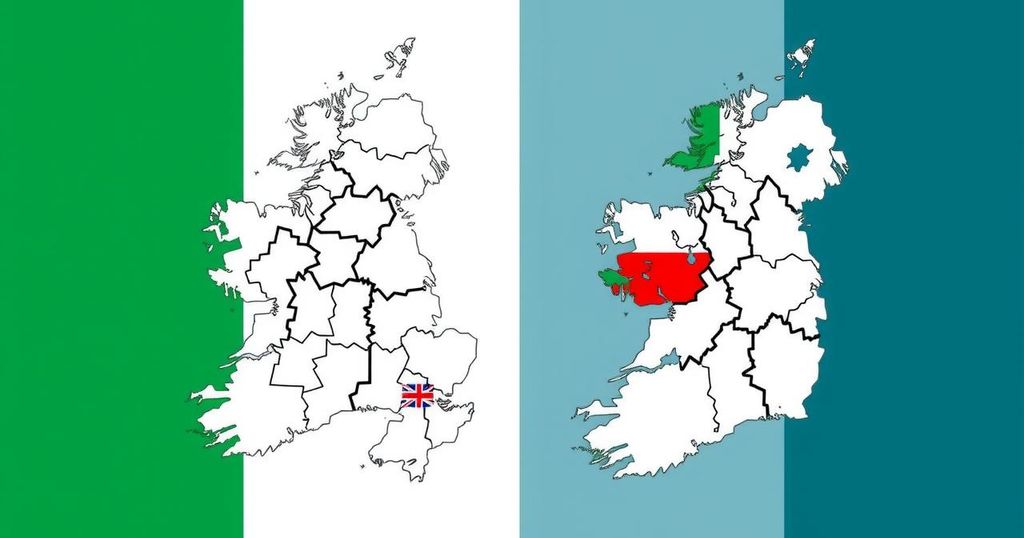Ireland Faces Coalition Government After Equal Party Support in Polls

An exit poll from the recent Irish parliamentary election indicates that the three largest parties—Fine Gael, Fianna Fail, and Sinn Fein—are receiving nearly equal voter support, paving the way for potential coalition governance. The election features significant concerns surrounding housing and immigration, reflecting broader economic pressures faced by the nation. Analysts predict a continuation of the existing coalition dynamics, emphasizing the challenges Sinn Fein faces in attempting to secure a governing role.
An exit poll released after Ireland’s parliamentary election indicates that the nation’s three largest political parties—Fine Gael, Fianna Fail, and Sinn Fein—have garnered nearly equal support among voters. With the poll showing Fine Gael at 21%, Fianna Fail at 19.5%, and Sinn Fein at 21.1%, it suggests a potential continuation of coalition governance. Although Sinn Fein seeks to reunite Northern Ireland with the Republic of Ireland, its prospects for forming a government may be limited due to refusals from Fine Gael and Fianna Fail to ally with them following historical tensions and differing political ideologies.
The outgoing government, led by Fine Gael and Fianna Fail, has held a dominant position in Irish politics for the last century, sharing power under a coalition formed after the 2020 elections. League upon previous historical divisions dating back to the Irish Civil War, both parties have alternated leadership roles, with Simon Harris currently serving as Taoiseach. Sinn Fein, which achieved unexpected success in 2020 by winning the popular vote, continues to be excluded from governing due to the longstanding rivalry and concerns over its leftist orientation and ties to the violence of the past. Additionally, this election features numerous independent candidates, representing a range of political views.
The primary concern for voters this election season has been the rising cost of living, particularly housing. Ireland experiences a significant housing shortage, a problem exacerbated by a lack of new home construction during and after the 2008 financial crisis. John-Mark McCafferty, CEO of housing charity Threshold, noted, “There was not building during the crisis, and when the crisis receded, offices and hotels were built first.” Consequently, the country is facing soaring housing prices, increasing rents, and homelessness.
The inclusion of immigration as a pressing issue reflects Ireland’s transition from a nation of emigration to one grappling with an influx of refugees and asylum seekers. Recent arrivals, including over 100,000 Ukrainians, have compounded the existing housing challenges. Moreover, there is a noticeable rise in tensions surrounding anti-immigrant sentiments, fueled by far-right voices on social media, although Ireland does not have a major far-right political party.
The likely outcome of this election points toward another coalition government formed primarily by Fine Gael and Fianna Fail, potentially complemented by a smaller party or a selection of independents. Political analysts suggest that the government’s structure will remain fundamentally unchanged, representing a continuation of a moderate governance approach. Political scientist Eoin O’Malley remarked, “It is just a question of which minor group is going to be the group that supports the government this time.”
As Ireland embarks on a new electoral cycle, the results of the election will reveal whether it aligns with global trends of government turnover in the face of public dissatisfaction, or if the existing political framework will be maintained. Support for Sinn Fein among working-class voters shows signs of fluctuation in light of its policies, especially regarding immigration. The full implications of the election results will become clearer once the vote counting concludes, potentially reshaping Ireland’s political landscape.
Ireland’s recent parliamentary elections have put the country on the path toward coalition governance once again, highlighted by an exit poll suggesting no party emerged with a clear lead. The political landscape is complicated by the historical rivalry between Fine Gael and Fianna Fail, two parties with similar center-right agendas but originating from opposing sides of the civil war’s aftermath. Sinn Fein has been rising in popularity but finds itself struggling to achieve governing power due to the reluctance of the two major parties to ally with it, stemming from past associations and policy differences.
In summary, the exit poll from the parliamentary election indicates that Ireland is likely to continue with coalition governance, perhaps between Fine Gael and Fianna Fail, as political stalemates witness Sinn Fein remaining outside of power. With critical issues like housing and immigration at the forefront of the electoral campaign, the results will certainly influence Ireland’s political direction for the foreseeable future. The coalition dynamics and voter preferences suggest a commitment to a moderate governance style amidst underlying public discontent regarding rising living costs.
Original Source: gazette.com








